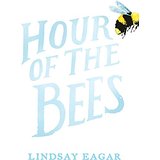 What could be worse for twelve-year-old Carol, needing to spend her summer in pool parties and sleepovers that will cement relationships for school in the fall, than to find out she must go with her family to the New Mexico desert for the summer? So begins Lindsay Eagar’s debut novel Hour of the Bees. Add Serge, a grandfather with dementia who can no longer live alone, and her dad’s mission to sell the ranch and move his father into a home where he will receive care. Also add a bossy older half-sister, not Serge’s biological granddaughter, who figures out ways not to pull her share of the load and a younger brother that often becomes Carol’s responsibility. The project of getting the property ready for sale will steal her summer. Carol reluctantly prepares herself for the ordeal by studying the brochure on what to expect from someone with dementia.
What could be worse for twelve-year-old Carol, needing to spend her summer in pool parties and sleepovers that will cement relationships for school in the fall, than to find out she must go with her family to the New Mexico desert for the summer? So begins Lindsay Eagar’s debut novel Hour of the Bees. Add Serge, a grandfather with dementia who can no longer live alone, and her dad’s mission to sell the ranch and move his father into a home where he will receive care. Also add a bossy older half-sister, not Serge’s biological granddaughter, who figures out ways not to pull her share of the load and a younger brother that often becomes Carol’s responsibility. The project of getting the property ready for sale will steal her summer. Carol reluctantly prepares herself for the ordeal by studying the brochure on what to expect from someone with dementia.
Strange magical twists come for Carol – not “Caro-leeen-a” as Serge insists she must be called in order to honor her Spanish roots. Carol recognizes the “word salad” typical of his dementia from her brochure, but not the magical bees connected to the hundred-year drought, a seed, and most of all the story that Serge tells in segments, beginning each stage with “Once upon a time . . .”
Two story lines have different voices. The first covers the very realistic problem of cleaning out a lifetime of stuff and memories to get Serge ready to move and the property read to sell, told in a narrative fashion that keeps the reader interested. The second story-within-the-story of the bees, the magical tree, and the community that used them up is told in a lyrical voice – worth reading just for the beauty of the language.
I read the last page of the book several days ago, but saying I finished it would be misleading. My mind returns to keeping family ties through diminished mental capacities, to knowing the importance of family roots, and to empathizing with Carolina who did the wrong thing for right reasons. Most of all, I like her perspective, “There is no ending because stories never end. They just turn into new beginnings, forever and ever. Like the rings of a tree trunk.”